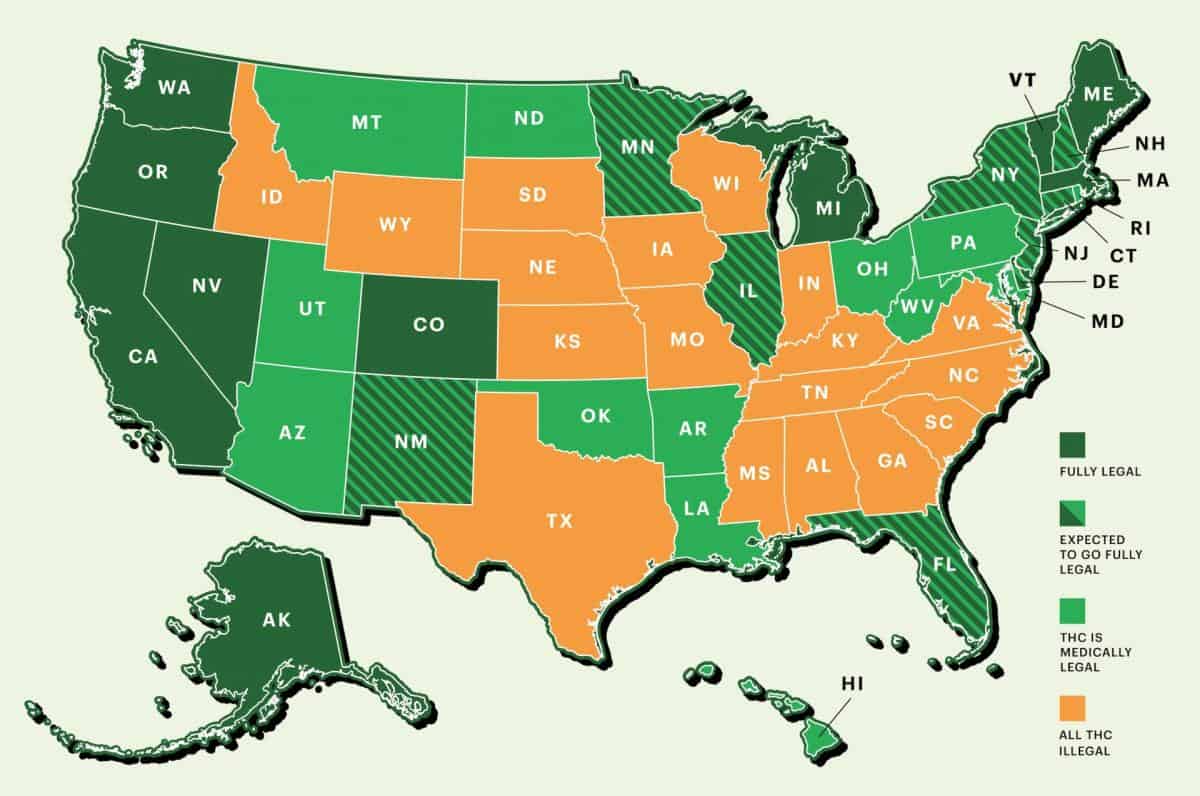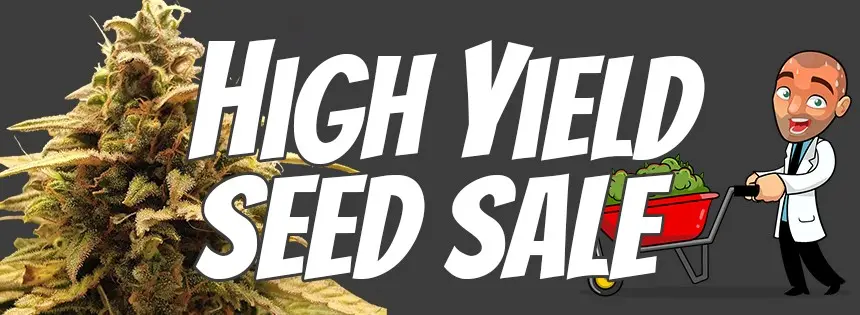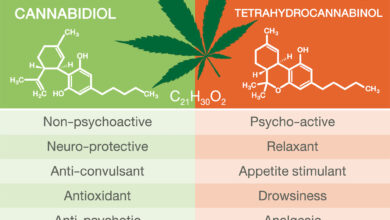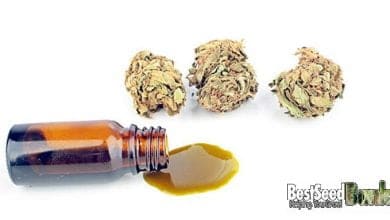Cannabis Laws in the United States – 2020. It is already clear the US is moving stedily towards legalization, . Some states do it faster than others, but full legalization is the general direction of most states.
33 US states have already approved medical cannabis, 11 have fully legalized, and another 15 have approved decriminalization. But in states like Kansas, Idaho, Kentucky, and Alabama – Cannabis is still prohibited for any purpose.

The following is a list of cannabis laws in the US:
Ohio – Decriminalized, Medical Use.
Population: 11.7 million
Ohio approved decriminalization in 1975 as part of the early wave. Possession of up to 100 grams of cannabis is not a criminal offense, and carries a maximum fine of $ 150. In 2016 Ohio approved medical cannabis and has 31,000 patients as of now. A full legalization bill failed in 2015 and there is currently no new proposal on the horizon.
Oklahoma – Medical Use.
Population: 4 million
Oklahoma residents voted for medical cannabis in the 2016 referendum with a 57 percent majority. In September 2018, the capital Oklahoma City did not incriminate possession of self-use cannabis with a fine of up to $ 400, urging state lawmakers to take a similar step. There are currently no bills on the chapter.
Oregon – Legal.
Population: 4.2 million
Oregon was the first state in the United States to ban cannabis in 1973, and its residents voted for full legalization in 2014. Oregon has 600 legal cannabis stores, more than any other state, which has led to its situation Supply exceeds demand.
Oregon recently approved the export of cannabis to other legalization states, which should solve its surplus problem. You can hold up to 28 grams of cannabis and grow up to 4 plants.
Idaho – Prohibited.
poplation: 1.8 million
Medical cannabis is illegal in Idaho, and possession of cannabis is a criminal offense – a medium offense (misdemeanor) up to 85 grams and a serious offense (felony) in greater quantity. A bill filed this year for medical cannabis approval was stuck and failed to pass before the session ends. A new proposal will be submitted in 2020.
Iowa – Prohibited.
Population: 3.2 million
In 2014, Iowa allowed medical use of cannabis oil containing up to 3% THC – since then no progress has been made toward a medical cannabis permit. In the same year, a failed decriminalization bill was also submitted.
Possession of cannabis in any quantity is a medium-degree felony (misdemeanor) felony, which, like Indiana law, does not differentiate between possession of a gram and possession of a pound.
Illinois – legal.
Population: 12.7 million
June 2019 underwriter Governor JB Pritzker on the recreational cannabis legalization bill, which comes into force in January 2020. Illinois is the 11th state to approve legalization and the first to do so in a governor’s decision and not in a referendum.
Indiana – Prohibited.
Population: 6.7 million
Cannabis is illegal for any purpose in Indiana, not even for medical use (except cannabis products containing less than 0.3% THC, according to The Law of the Economy). In 2013, a decriminalization bill failed, and in 2015, a medical cannabis approval bill also failed.
Possession of cannabis in any quantity is a medium-degree felony (misdemeanor) felony, with the law not at all distinguishing between possession of a gram and possession of a pound. Possession of 4.5 pounds or more carries a minimum sentence of 2-8 years in prison.
There are currently no bills in sight, but Indiana shares a border with two new legalization states: Michigan from the north and Illinois from the west. Both are about to start their legal cannabis sales soon, so Indiana is going to be much harder to enforce its total ban on cannabis.
Alabama – Prohibited.
Population: 4.9 million
Alabama has tough cannabis laws that are unlikely to change anytime soon. Self-possession is a medium-degree felony offense (misdemeanor), but from the second time, it is a serious criminal offense (crime). As of 2016, Alabama blacks have a nearly four-fold chance of being arrested for possession of cannabis versus whites, and in other areas, that figure jumps by 10.
Medical cannabis is illegal in Alabama, with the exception of CBD oil containing less than 0.3% THC according to The Law of the Economy.
Alaska – legal.
Population: 737,000
Alaska approved legalization in 2014, but to date it has the lowest sales of all legalization states. However, the state hopes that coming into force later this year of the law that will initially allow consumption of cannabis outside the home will lead to the opening of coffee shops and entertainment venues that will boost sales.
You can hold up to 28 grams and grow up to 12 plants.
Arizona – Medical Use.
Population: 7.2 million
Medical cannabis was approved in a 2010 Arizona referendum with a minimal 50.1 percent vote in favor. In 2016, a full legalization bill was rejected by a small majority, with 48.7% voting in favor. Survey March 2019 shows that today there is already a majority for legalization in the country, with 59% of respondents voting in favor.
Arkansas – Medical Use.
Population: 3 million
In November 2016, Arkansas Medical Cannabis was approved in a referendum with 53 percent voting in favor. Possession of up to 110 grams of cannabis is a moderate (misdemeanor) criminal offense for the first two times and becomes a serious criminal offense (crime) for the third time. This year, a bill for decriminalization was introduced, but it did not go far before the Legislature’s seat closed.
Georgia – Prohibited (almost) completely.
Population: 10.5 million
In 2015, Georgia approved the medical use of cannabis oil containing less than 5% THC. Medical cannabis is still illegal. Possession of up to 28 grams is a felony of medium severity (misdemeanor), and possession of a larger amount is a serious criminal offense (felony). Blacks are 3.7 times more likely to be arrested for possession of cannabis compared to whites in Georgia. There are currently no new bills on the chapter in the state.
Delaware – decriminalized and Medical Use.
Population: 967 thousand
On June 5, the Delaware House House Economics Committee voted to advance the cannabis legalization bill by a 7-member majority and a committee against one opponent. However, on June 30, the seat of the House of Representatives ended, so the proposal would not be put to the vote until the January 2020 resumption.
In December 2015, Delaware approved the decriminalization of holding up to 28 grams of cannabis, with a fine of up to $ 100. Delaware approved medical cannabis in 2011.
South Dakota – Prohibited.
Population: 882 thousand
South Dakota joined the early wave of decriminalization in 1977, but very quickly “regretted” and returned the criminal punishment, and possession of self-use has since become a medium-degree (misdemeanor) felony.
There were at least 3 medical cannabis legalization bills that failed in South Dakota between 2006 and 2015. There are currently no bills in sight.
South Carolina – Prohibited.
Population: 5.1 million
Cannabis is prohibited for any purpose in South Carolina, except for cannabis oil containing less than 0.9% for medical purposes, starting in 2014. This year, a bill to approve medical cannabis was filed, but it is still stuck.
Hawaii – Decriminalized and Medical Use.
Population: 1.4 million
June 2019 Approved decriminalization of holding up to 3 ounces in Hawaii will take effect in January 2020. A full legalization bill passed this year unanimously in the Senate Judiciary Committee, but it failed to pass another committee before its last date. There are currently no further bills in place.
Hawaii is one of the first states in the United States to approve medical cannabis in 2000.
Wyoming – Prohibited.
Population: 578 thousand
In Wyoming even being under the influence of cannabis is a criminal offense of a degree of a misdemeanor, as is the possession of up to 78 grams per target. Surveys show 62% support for decriminalization and 81% support for medical cannabis among residents but attempts to pass alternative legislation have failed in recent years.
Virginia – (almost) prohibited.
Population: 8.52 million
Virginia has approved medical use of cannabis oil containing up to 5% THC in 2015, with the exception that any possession of cannabis is a misdemeanor type offense. Inclusion and full legalization bills failed in the 2019 session.
In June, Attorney General Mark Herring declared that he was in favor of decriminalization, which improves the odds in 2020. According to polls, 8 out of 10 Virginia residents support decriminalization and 62% support full legalization.
Washington, DC – legal.
Population: 7.5 million
Washington is the first US state to fully legalize in 2012, 4 days before Colorado. Up to 28 grams of cannabis is allowed, but home growth is prohibited – except for patients.
Washington DC – (almost) legal.
Population: 633,000
The US capital of Washington DC approved legalization in 2014, but without opening legal cannabis stores. It did allow up to 6 plants. A bill to approve the sale of cannabis in stores was filed in January 2019 and is still pending.
Following the ban on cannabis stores, a gray market was created within which anyone who wants to sell cannabis sells another product with him and claims that the cannabis was ‘given as a gift’ with the other product. Cannabis must not be sold, but it is allowed to ‘give it as a gift’.
Wisconsin – Prohibited.
Population: 5.8 million
Cannabis is by no means prohibited – possession of any quantity is a misdemeanor for the first time and a felony for the next. Governor Tony Eber has expressed support for decriminalization and medical cannabis, but Republican lawmakers in the state are opposed.
Vermont – legal.
Population: 626 thousand
Vermont approved full legalization in 2018 and is the first to do so in a governor’s decision and without a referendum. The original bill only included the removal of punishment for possession of up to 28 grams and the growth of up to 2 plants – but did not regulate the store issue.
A supplemental bill filed this year complements the issue of legal cannabis stores, but is expected to go up for voting only next year. Until then, Vermont residents are allowed to grow themselves, but they have no place to buy cannabis.
Tennessee – Prohibited.
Population: 6.8 million
Cannabis is strictly prohibited for any purpose in Tennessee except for oil containing less than 0.9% THC for medical purposes, starting in 2015. However, in the two largest cities in the state, Nashville, and Memphis, local decriminalization was approved in 2016, with a $ 50 fine.
In February 2019, two medical cannabis legalization bills were tabled, but they were not expected to obtain the necessary majority and so in April it was decided to withdraw and re-raise them by 2020. According to the polls, 81 percent of Tennessee residents support medical cannabis.
Texas – Prohibited.
Population: 28.7 million
In April 2019, the Texas House of Representatives Voted for A 98-vote decriminalization bill against 43 against. However, the law is not expected to pass in the Senate, largely because of the fierce opposition of Lieutenant Governor Dan Patrick.
It should be noted that quite a few Texas cities, including Austin and Dallas, have already adopted local decriminalization policies. Texas has allowed medical cannabis with a THC concentration lower than 0.5%, and it’s hard to know how long it will take for the conservative state to approve a real medical cannabis program.
Utah – Medical Use.
Population: 3.2 million
Utah is the first U.S. state to ban cannabis in 1915. In 2018, she approved medical cannabis, but non-medical possession is still a medium-degree criminal offense up to 28 grams and a more serious offense in larger quantities. There are currently no bills in sight.
Louisiana – Medical Use.
Population: 4.7 million
In 2015, Louisiana approved medical cannabis, and also replaced the punishment for possession of cannabis in any amount with a $ 300 fine – but only for the first time. For the second time, it is a criminal offense of medium severity (misdemeanor), and from the fourth time, it is already a serious criminal offense (crime).
Montana – Medical Use.
Population: 1 million
Medical cannabis was approved in Montana in the 2004 referendum with a majority of 62 percent voting in favor. However, in 2011, Republicans in the state made an attempt to re-ban medical cannabis, which ended up applying severe restrictions and denying licenses from many patients, reducing their number from 31,000 in 2011 to just 9,000.
Another referendum was held in November 2016, this time on a bill designed to repeal the new restrictions on medical cannabis. The proposal passed with a majority of 58 percent voting in favor, indicating Montana residents and government don’t see eye to eye.
Possession of up to 60 grams is a felony of medium severity (misdemeanor), and possession of over 60 grams is a serious criminal offense (crime).
Missouri – (almost) Decriminalized and Medical Use.
Population: 6.1 million
In March 2014, Missouri’s decriminalization possession of up to 10 grams was approved, but only for the first time. For the second time, it is a criminal offense of medium severity (misdemeanor). Missouri approved medical cannabis in 2018 with 66 percent voting in favor of a referendum.
Maine – legal.
Population: 1.3 million
In 1976, Maine was the third state in the United States to discriminate against the possession of a small amount of cannabis, and in 2009 the quantity was raised to 70 grams. Full legalization was approved in the November 2016 referendum, and legal sales are expected to begin in 2020.
You can hold up to 71 grams of cannabis and grow up to 12 plants.
Minnesota – Decriminalized and Medical Use.
Population: 5.6 million
In November 2018, Minnesota residents elected a new governor, Tim Waltz, who supports legalization. However, his election has not yet translated into results, and bills submitted to both the House of Representatives and the Senate have failed to pass committees.
In 1976, during a brief wave of decriminalization that swept across several states in the United States, Minnesota approved the decriminalization of holding up to 42.5 grams of cannabis, and in 2014 also approved medical cannabis.
Massachusetts – legal.
Population: 6.9 million
Massachusetts approved full legalization in the 2016 referendum with a majority of 54 percent voting in favor. Licensing bureaucracy has slowed store opening, but the legal cannabis market in Massachusetts is expected to start growing rapidly this year.
You can grow up to 6 plants and hold up to 28 grams of indoor cannabis and 280 grams of indoor cannabis.
West Virginia – Medical Use.
Population: 1.8 million
Medical cannabis was approved in 2017, possession of cannabis for recreational purposes in any amount is a misdemeanor offense.
Maryland – Decriminalized and Medical Use.
Population: 6 million
In 2013, medical cannabis was approved in Maryland, and in April 2014, decriminalization of holding up to 10 grams was approved. The penalty is a $ 100 fine for the first time, $ 250 for the second time, and $ 500 for the third time.
In a 2016 survey, 61 percent of Maryland residents supported full legalization, but a bill passed in 2017 failed to pass in Congress.
Michigan – legal.
Population: 10 million
Michigan approved medical cannabis in 2008, and 10 years later in 2018 Approved Full legalization with a 56% majority in the referendum. Legal cannabis stores are expected to open by early 2020. It is allowed to grow up to 12 plants and hold up to 70 grams of indoor cannabis and 700 grams of indoor cannabis.
Mississippi – (almost) decriminalized.
Population: 3 million
Like Minnesota, Mississippi also jumped on the early wave of decriminalization in the 1970s, setting a $ 250 fine for holding up to 30 grams for the first time. In contrast to Minnesota, Mississippi, starting with the second time, is a low-level criminal offense (Petty Misdemeanor).
Medical cannabis has not yet been approved in Mississippi (except for CBD oil in 2014), making it one of the only states with decriminalization non-medical cannabis.
Nebraska – (almost) decriminalized.
Population: 1.9 million
Nebraska is another of the states that jumped on the wave of decriminalization in the 1970s, but it has adopted decriminalization of self-possession possession for the first time – starting with the second time of any quantity is a medium-degree (misdemeanor) offense.
In 2012, there were 7,756 arrests for possession of self-use cannabis in Nebraska, the highest rate of cannabis arrests in the United States. According to the American Civil Liberties Union, blacks in Nebraska are 5 times more likely to be arrested for cannabis possession than whites.
In 2014, Nebraska, along with Oklahoma, tried to sue neighboring Colorado State because legalization there infiltrates cannabis into Nebraska. In 2016, the Supreme Court dismissed the lawsuit. In 2015, a bill to approve medical cannabis was dropped in the Senate vote because of a 3-vote gap.
Nevada – legal.
Population: 3 million
In November 2016 Approved Nevada is fully legalized with a 55% majority voting in the referendum. Nevada residents are allowed to hold up to 71 grams of cannabis but are not allowed to grow it themselves unless they live at least 40 miles from the nearest cannabis store. If they live far enough away, they are allowed to grow up to 6 plants.
New Hampshire – Decriminalized and Medical Use.
Population: 1.4 million
In 2013, New Hampshire approved medical cannabis, and in 2014 a bill for full legalization in the state failed. In April 2017, a decriminalization charge of up to 21 grams was approved, with a $ 100 fine for the first and second time and a $ 300 fine starting the third time.
In April 2019, a new legalization bill was passed in the House of Representatives with a majority of 200 votes in favor of 163 against. However, on May 30, the Senate voted to postpone the bill hearings by January 2020.
Importantly, all three states bordering New Hampshire: Maine, Vermont, and Massachusetts, have already approved full legalization.
NJ – Medical Use.
Population: 8.9 million
In 2010, New Jersey approved medical cannabis, and in the past two years, several full legalization bills have failed. Lawmakers are currently trying to raise a referendum with a new bill next year. Democratic governor Bill Murphy has stated he supports legalization.
Currently, possession of up to 50 grams is a felony of medium severity (misdemeanor) in New Jersey, and possession of over 50 grams is a felony (felony). In 2017, 34,500 people were arrested in New Jersey for cannabis offenses – more than any other U.S. state.
New Mexico – Decriminalized and Medical Use.
Population: 2.1 million
New Mexico has a thriving medical cannabis market with over 90 stores, and in April 2019, it approved the decriminalization of holding up to 15 grams of cannabis with a mere $ 50 fine. Although polls show that 60 percent of residents support full legalization, a bill this year failed to pass in Congress, and a new bill will be tabled next year.
New York – Decriminalized and Medical Use.
Population: 19.5 million
In July 2019, Governor Andrew Como signed the decriminalization bill, which set a $ 50 fine only for possession of up to 28 grams of cannabis. Earlier this year, a full legalization bill was tabled, which won the governor’s support but did not receive enough Senate support to cast a vote before the seat closed.
According to a 2017 survey, 62 percent of New Yorkers support legalization, and the bill will be rescheduled next year at the beginning of the session. New York approved medical cannabis in 2014, even then under Governor Andrew Como.
Florida -Medical Use.
Population: 21.3 million
With 190,000 cannabis patients so far, and after March’s plan to restrict patients to only oil (without flowers), the Florida medical cannabis industry is expected to continue to grow.
As of June 2015, there is a trend in Florida’s cities and districts that approve local cannabis decriminalization, but the 2017 decriminalization bill submitted to the House of Representatives failed to move forward. Possession of up to 20 grams of cannabis is a moderate criminal offense (misdemeanor), and possession of over 20 grams is a serious criminal offense (crime).
Pennsylvania -Medical Use.
Population: 12.8 million
Possession of decriminalization is a medium-term (misdemeanor) felony offense in Pasinlabania, but some of the largest cities in the country have local decriminalization laws. Medical cannabis was approved in 2016.
A legalization bill was tabled this year, with the support of Governor John Federman and about 65% of residents estimated. She is expected to come up for discussion and voting next year.
North Dakota – Decriminalized, Medical Use.
Population: 760,000
North Dakota approved medical cannabis in a 2016 referendum with 64 percent of residents voting for it. In May 2019, decriminalization of holding up to 15 grams was approved, but with a particularly high $ 1,000 fine.
In November 2018, a full legalization referendum was tabled, which was rejected by a majority of 59% who voted against and 41% who voted in favor. State lawmakers are currently working on another referendum on legalization ahead of next year’s presidential election.
North Carolina – Decriminalized.
Population: 10.4 million
North Carolina was also part of the wave of decriminalization in the 1970s, and to this day the possession of up to 15 grams of cannabis is not a criminal offense. A medical cannabis approval bill failed in 2014, and in March 2019, a new proposal that has yet to be voted on was tabled.
Polls show that 80 percent of North Carolina residents support the legalization of medical cannabis.
According to the Association for Civil Rights, 50% of cannabis arrests in the country are blacks, even though they make up only 22% of the population.
Colorado – legal.
Population: 5.7 million
Colorado is the second state (after Washington) to legalize in 2012. In 2018, cannabis sales in the state totaled $ 1.55 billion, and the state earned $ 266 million in taxes.
You can hold up to 28 grams and grow up to 6 plants.
Connecticut – Decriminalized and Medical Use.
Population: 3.6 million
Since 2011, Connecticut has had decriminalization of holding up to 14 grams of cannabis, with a fine of up to $ 150 for the first time and $ 200- $ 500 for the next. Young people under 21 who are caught with any amount of cannabis are denied a 60-day driver’s license.
A June 2019 survey found that 59 percent of Connecticut residents support the full legalization of cannabis for recreational purposes. Legal medical cannabis in Connecticut since 2012.
California – legal.
Population: 39.6 million
California was the first state to approve medical cannabis in 1996, and in 2016, it approved referendum legalization by 57 percent. Legal sales began in 2018, are allowed to hold up to 28 grams and grow up to 6 plants.
KANSAS -Prohibited.
Population: 2.9 million
Cannabis is not legal for any purpose in Kansas, nor is medical cannabis (except for products containing less than 0.3% THC, by following the law of the economy). Attempts to pass a medical cannabis approval bill in 2013 and 2015 have been unsuccessful, and there are currently no further bills in place.
Possession of up to 450 grams is a criminal offense of medium severity (misdemeanor) for the first time, beginning in 2017 for the second time as well. From the third time, this is a serious criminal offense (crime).
Kentucky -Prohibited.
Population: 4.5 million
Cannabis is illegal for any purpose in Kentucky except for Hemp and CBD in accordance with state law. In 2015, a medical cannabis permit bill failed, largely because of opposition from conservative groups that put pressure on Congress and the Senate.
In March 2019, another medical cannabis bill was passed in the House of Commons with a large majority of 16 votes in favor and 1 against. But the House of Representatives was delayed by raising the ballot proposal, and now that the voting seat is over, it will have to wait until next year.
Holding up to 230 grams and growing up to 5 plants is a criminal offense of medium severity (misdemeanor), and possession or increase of larger quantities is a serious criminal offense (crime).
Rhode Island – Medical use, Decriminalized.
Population: 1 million
Rhode Island has decriminalization of holding up to 28 grams of cannabis, with a $ 150 fine, but anyone caught 3 times in 18-months has already been subjected to criminal proceedings. Medical cannabis was approved in the state in 2006, and as of 2016, it has about 15,000 patients.
2017 polls show 59 percent legalization in full Rhode Island, but there is currently no such bill on the horizon.



